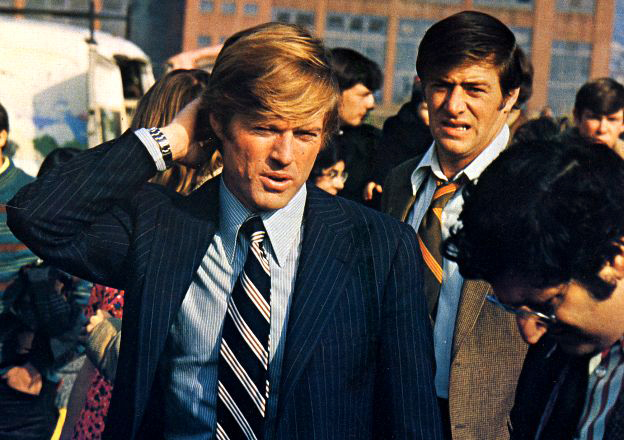Lights, Camera, Political Action: ‘The Candidate’

The character Bill McKay (left) in the 1972 Robert Redford film “The Candidate” bears similarities to presidential hopeful Sen. Bernie Sanders, I-Vt. (Warner Bros.)
By Kevin Truong
Oct. 9, 2015 12:45 a.m.
Flip on a news channel and you’re likely to see characters with perfectly coiffed hair making fantastical claims directly at the camera. But how far does this connection between political figures and entertainment go? Each week, A&E columnist Kevin Truong will look at a movie through the lens of modern politics, analyzing whether the political climate has changed or remained the same.
A lot about “The Candidate” feels anachronistic.
The 1972 Robert Redford flick features wide collars, wide ties and even wider mustaches. Hippies pop up every so often, and the overwhelmingly white and male campaign staff members are decked out in ugly, earth-toned suits.
But perhaps the most comforting – or maybe depressing – thing is how familiar it all seems.
Redford, whose glorious blond mop is in full display, plays Bill McKay, the son of a former California governor. In many respects, McKay is the perfect idealistic leftist. He has a million-dollar smile and burns the midnight oil as a beachside environmental lawyer fighting the oil industry and promoting efforts to conserve the watershed.
Well, that’s until a campaign adviser taps him to be the Democratic candidate for Senate, running against the seemingly invincible Republican incumbent: Sen. Crocker Jarmon.
What convinces Redford’s character to run isn’t the chance to affect legislation, or to jumpstart his political career on the national stage, but a matchbook with a simple note written in black pen: “You lose.”
In essence, McKay is given the opportunity to become a well-publicized issue candidate. He is allowed to say whatever he wants and promote the things that matter to him like reproductive rights, environmental protection and, a bit closer to home, abolishing the University of California Board of Regents.
The point of his candidacy is not to win, but to inject some vigor into the election: to be “authentic.”
Compare his candidacy to those in the current presidential race like Lawrence Lessig, a professor at Harvard Law School whose only position is campaign finance reform, or Sen. Rand Paul, R-Ky., whose run for the nation’s top office is hopeless at this point, so he’s free to get some libertarian licks in during the debates.
Probably the most interesting parallel though is to the independent Vermont Sen. Bernie Sanders. For those who have been living under a social media rock, Sanders is the 74-year-old, self-proclaimed socialist with an air of a curmudgeonly grandpa who everyone in college seems to like.
Sanders’ candidacy gained steam over the summer from the kinds of grassroots activism that propelled President Barack Obama from national neophyte to the country’s commander in chief. But to call Sanders an “outsider” to Washington is inaccurate: He’s served in Congress for more than two decades.
What he is, though, is an iconoclast. When Sanders declared his candidacy in April, most political commentators saw him as a McKay-esque candidate dedicated to pushing the Democratic frontrunner Hillary Clinton to the left on issues like Wall Street reform, and bringing overlooked problems to the forefront of the national debate.
In the film, McKay’s straight-talking style, including the ability to admit when he doesn’t know something, starts to win him chuckles from an amused press and then popular support.
As he moves toward being a legitimate candidate, he picks up the politician’s stump speech and vices, including romps in the sack with a donor’s wife. A debate with Jarmon devolves into chaos and McKay rails against the vapidity of the entire election in his closing speech.
Sanders has acquired a cult following based on many of the same qualities that kept the electorate interested in McKay: a rigid adherence to his values and an outspoken nature.
At certain points, Bernie’s mouth has gotten him into trouble. He has had altercations with Black Lives Matter protesters and his mixed record on gun control might raise concerns among some progressives. But as his bus looms ever larger in the rearview mirror of the Clinton campaign, the biggest obstacle to Bernie’s candidacy is keeping these qualities strong, even as the belief that he can win starts to seem less and less far-fetched.
If actually elected, he will struggle to reconcile the weakness of a presidency in a hostile congressional environment with the overwhelming belief that he can change Washington. One only needs to look at the disillusionment during Obama’s presidency from the high of his inauguration six years ago to see the problems that arise when fantasy meets reality.
After the debate against Jarmon, McKay pulls off a major upset and wins the election. While his wife chats about which neighborhood of Washington she would like to live in, McKay walks through his headquarters with a look of slack-jawed disbelief.
“What do we do now?” he asks his elated campaign manager before the throngs of adoring fans pull him out for his victory speech.
He never receives an answer.


